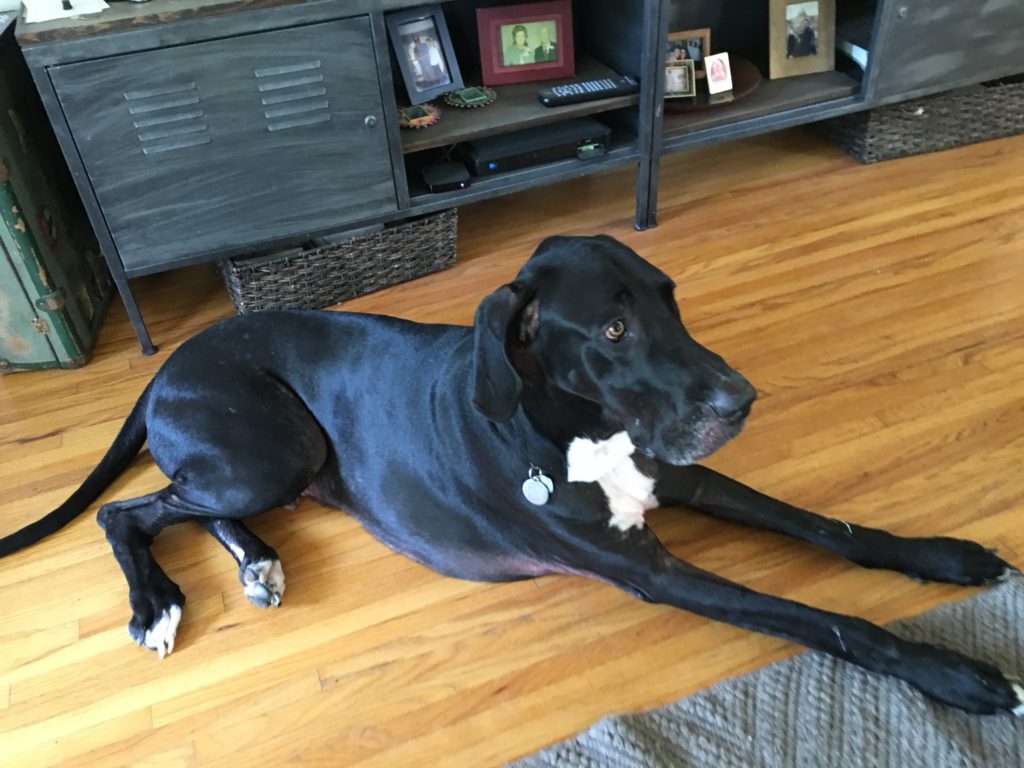Helping a Great Dane Get Over His Fear of Fireworks and Stop His Over Barking
By: David Codr
Published Date: June 3, 2016
Sylvester is a three-year-old Great Dane in Los Angeles who barks a lot when left alone, gets scared when he hears fireworks, doesn’t always listen to his guardians and pulls on the leash on walks.
Sylvester has a fittingly loud bark to go with his giant stature. Going into the session, I knew that barking was one of the primary issues that the guardians wanted to address, so it was good for me to see sic, hear how much he barked when a guest arrived.
I sat down with his guardians and their two other dogs to discuss the situation and how I could help.
I always like to start out my sessions by chatting with the clients for a few minutes about the dog’s structure and routine. This gives me an opportunity to observe the dogs as well as how the humans interact with them. It’s pretty common for many of my clients to inadvertently and unknowingly reinforce the exact behaviors they want to eliminate.
By incorporating rules, boundaries and limits, and enforcing them with good timing, Sylvester’s guardians can quickly articulate what it is they do and do not want from their dogs. Additionally, each time the guardians correct the dogs for breaking the rules, they will help the dog see them as more of an authority figure.
One of the easiest ways for their guardians to help change the leader follower dynamic is to practice a technique that I developed a few years ago called Petting with a purpose.
While rewarding desired behaviors is always my first step, knowing how to disagree with unwanted behaviors is equally important. To that end I spent several minutes discussing how Sylvester’s guardians can disagree with him in a way that the dog will understand and respect.
To address Sylvester’s barking at people passing by the home, and the fear of loud noises / fireworks, I spent a few minutes going over a counter conditioning technique.
Counterconditioning is a very methodical process that takes time. Many people do not have the patience and try to move things along at their own pace rather than reading the dogs cues.
This shouldn’t be the case for Selvester as his guardians are dedicated to addressing these issues and seemed to understand patience and consistency is required. I’m confident they will spend the time needed to help Sylvester learn that passersby, the mailman and the sound of fireworks are nothing to be alarmed about. in fact, if the guardians master these counterconditioning techniques properly, the dog will actually learn to look forward to these activities and sounds.
We spent a few additional minutes counterconditioning Selvester to the sound of knocking at the door. At first Sylvester ignored the treat and tried to bark and get to the door, so we had to increase the distance by moving away from the door. I chose a location that was in between the dinner table and a cabinet to prevent him from being able to move around. This location’s limitations combined with an increased distance to the door enabled Sylvester to start focusing on the teat and his guardian rather than barking while one of his guardians knocked repeatedly at the front door.
By the end of the session, Sylvester was refraining from barking as people passed by the front of his home. Now it’s going to take time and practice at the counterconditioning exercise before this becomes a permanent new behavior. But I was very pleased with his progress.
As his guardians get used to Petting him with a purpose, enforcing new boundaries and rules with good timing and adopting more of a leadership role, Sylvester will start listening to them faster, get over his fear of fireworks and gradually stop engaging in his unwanted actions and behaviors altogether.
Categorized in: Dog Behavior


